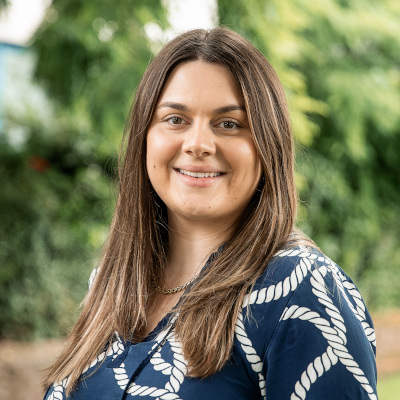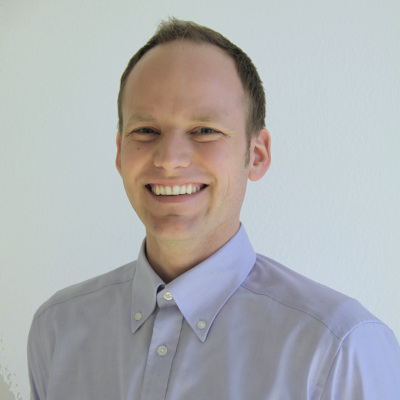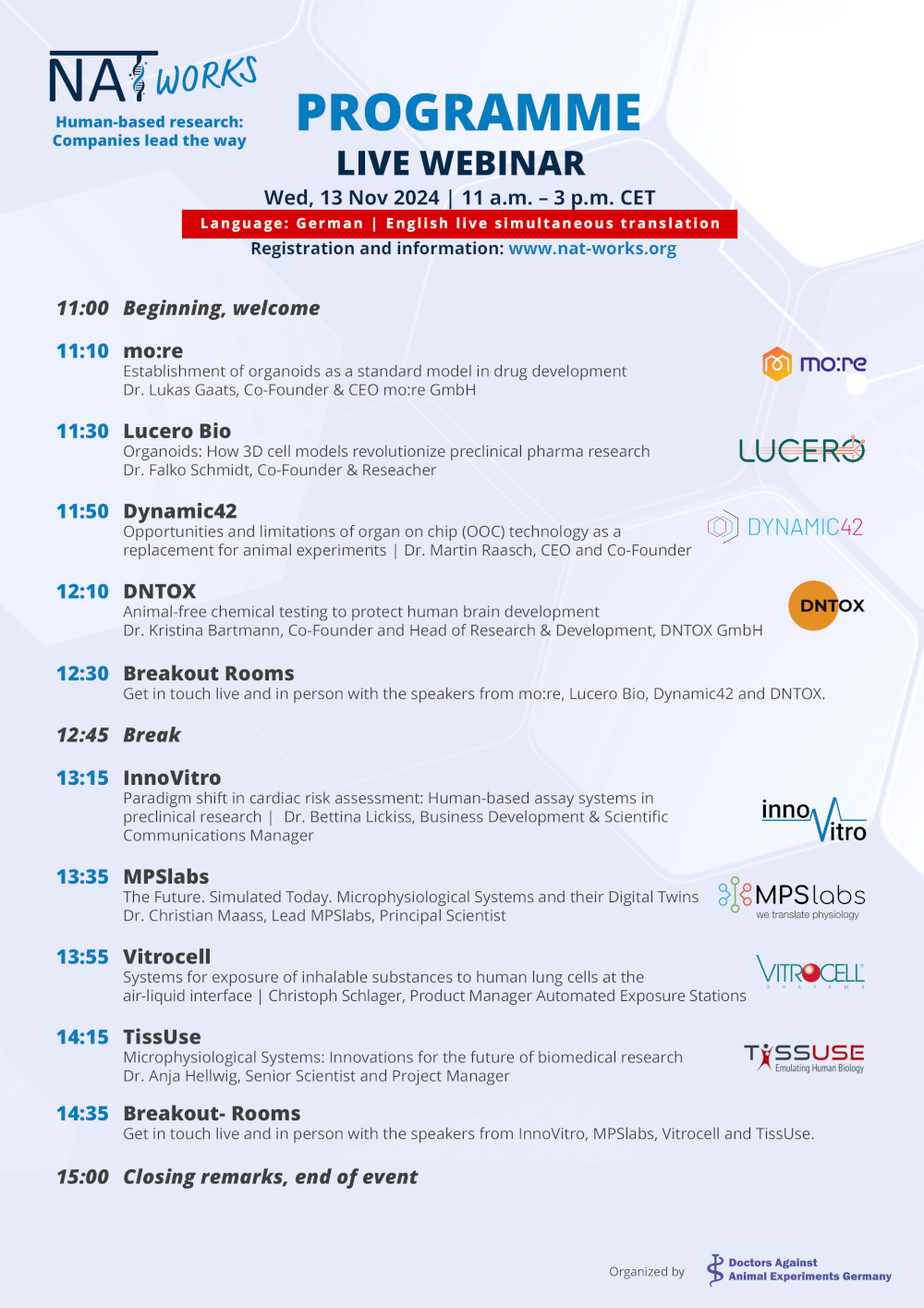About the webinar
On November 13th, 2024, the first NATworks webinar took place. 8 companies presented how their companies are helping to replace animal testing with state-of-the-art technologies and innovative research. In each 15-minute lecture, they presented their research work and product developments.
The main target group consisted of students, graduates and anyone interested in pioneering animal-free methods. There was time for personal exchange in the breakout meeting rooms, where the participants could personally pose questions to the employees of the respective companies, which was also gladly accepted. Contacts were made that could help plan and shape a potential career path in industry if wanting to work with these innovative methods in the future, and collaborations were discussed.
Companies, speakers and recordings
DNTOX is a bioanalytical testing laboratory for the non-animal screening of chemicals for their potential to disrupt human brain development and cause developmental neurotoxicity (DNT). The in vitro test methods we use are based on human cell models and are evaluated using a specially developed AI. Our interdisciplinary team is united by the common goal of a future in which the safety of chemicals and medications can be assessed reliably and without the use of animal testing.

Dr. Kristina Bartmann is a biologist who received her PhD in 2022 at the IUF – Leibniz Institute for Environmental Medicine Research in Düsseldorf. During her PhD, she focused on the development and validation of stem cell-based test methods contributing to a human in vitro battery for regulatory developmental neurotoxicity testing. Her research centered on test methods that investigate the electrical activity of neural networks in 2D and 3D models. At the same time, she co-founded DNTOX GmbH with colleagues.
DNTOX
Please find the recorded lecture here:
By viewing the video, you agree that your data will be transmitted to YouTube and that you have read the data protection declaration.
Dynamic42 was founded 2018 in Jena as a spin-off of the University Hospital Jena. We develop and market human organ-on-chip models for preclinical research and development as well as for testing novel pharmaceutical products, chemicals and food additives.
Furthermore, we are specialized in immunocompetent organ-on-chip models, integrating components of the immune system, which play a significant role in the occurrence of adverse effects of drugs and have been neglected in the industry and in two-dimensional test systems. Our platform enables toxicity screenings and ADMET studies already in preclinical phases on complex microphysiological models of human organs. Hereby, we accompany commercial manufacturers as well as scientists in biomedical research in the design and execution of preclinical studies.
In addition, we develop human disease and infection models in our chip platform, both internally and with external partners – especially in areas where no animal models are available.

Dr. Martin Raasch is CEO and Co-Founder at Dynamic42.
Dynamic42
Please find the recorded lecture here:
By viewing the video, you agree that your data will be transmitted to YouTube and that you have read the data protection declaration.
innoVitro GmbH is a contract research organization that offers human-based screening services for pharmacological risk assessment and efficacy testing worldwide. Each service is customized by a team of experts in close cooperation with the customer and carried out as an end-to-end study report in less than 6 weeks.
The screening parameters include structural and functional endpoints of human iPS cell-derived cardiac cells, which are analysed using a high-throughput system in 96-well plates. Drug-induced changes in healthy or diseased cells can be assessed in terms of cellular and electrophysiological properties as well as contractility.

Dr. Bettina Lickiss holds a degree in biology and a PhD in neurobiology from the Ruhr University in Bochum. Since 2019, she has been part of the innoVitro team, where she is responsible for scientific communication and business development. Previously, she gained extensive experience as a scientist at Axiogenesis AG, where she specialized in the use of human iPSC-derived cell models for preclinical research.
innoVitro GmbH
Please find the recorded lecture here:
By viewing the video, you agree that your data will be transmitted to YouTube and that you have read the data protection declaration.
Lucero Bio is a spin-off of Gothenburg University whose mission is to further advance research on 3D cell models and organoids for the pharmaceutical industry. Since 2019, the team has grown to 5 employees who specifically deal with microfluidic methods. Based in AstaZeneca's BioVentureHub, the young company has already won several startup awards and national and European research funding. These include the prestigious EIC Transition endowed with 1.1 Mio. euros.

Dr. Falko Schmidt received his doctorate in applied physics from Gothenburg University in Sweden in 2021. During this time, he founded the biotech company Lucero Bio with other colleagues. Dr. Schmidt is currently continuing his research at the Swiss Federal Institute of Technology in Zurich on optofluidic methods for manipulating organoids.
Lucero Bio
Please find the recorded lecture here:
By viewing the video, you agree that your data will be transmitted to YouTube and that you have read the data protection declaration.

mo:re is a Hamburg-based biotechnology start-up founded in 2023 that is developing the new gold standard for animal-free drug development. We offer a laboratory platform that industrializes organoid culture workflows. Our protocol database provides users with validated organoid know-how, making their use cost-effective and reproducible for pharma & biotechnology institutions.

Lukas Gaats is is co-founder & CEO of mo:re GmbH. He has been passionately researching the interdisciplinary field of 3D cell culture since 2019, which led to the spin-off of mo:re GmbH in 2023.
mo:re
Please find the recorded lecture here:
By viewing the video, you agree that your data will be transmitted to YouTube and that you have read the data protection declaration.

Led by Dr. Christian Maass, MPSlabs is a dedicated research and business unit situated under the umbrella of ESQlabs, led by CEO Dr. Stephan Schaller. MPSlabs spearheads the development of digital twin platforms for organ-on-chip and micro-physiological systems, bringing invaluable expertise to projects that require advanced simulation and modeling capabilities. ESQlabs specializes in modeling and simulation, focusing on pharmacokinetics, pharmacodynamics, and physiologically based pharmacokinetic (PBPK) modeling. The company is a significant contributor to and user of the open-source OSP Suite, enhancing its development and community engagement. ESQlabs offers a range of services that include model building, refinement, data integration, and consulting in life sciences and pharmacology. With a team of more than 30 skilled scientists, the company's expertise spans modeling, statistics, pharmacology, and software development. The OSP Suite, central to ESQlabs' operations, is continually expanding in its applications and user base, especially in creating digital representations of human biology.

Dr. Christian Maass is a physicist and computational biologist with over 15 years of academic and industrial international experience. He received his Master in Medical Physics from the University College London in 2012 and PhD from the University of Heidelberg in 2015 and worked as a postdoctoral researcher at the Massachusetts Institute of Technology (MIT), Cambridge, MA, USA until 2018. He specializes in developing and applying digital twins for micro-physiological systems and organs-on-chips (OoC). He is passionate about the integration of computational modeling and biological experiments for translational pharmacology applications. As a principal scientist in industry, Dr. Maass works on applications in various therapeutic areas, e.g. neurodegenerative, inflammatory, and metabolic diseases (Alzheimer, rheumatoid arthritis, NASH/NAFLD). Among others, he developed individualized PBK models for molecular radiotherapy (leukemia), automated workflows for big data (*omics), network-based analysis of inflammatory diseases, and mechanistic modeling of OoC data. He is also leading the division to develop further strategies integrating OoC data and computational modeling for translational pharmacology applications.
MPSlabs
Please find the recorded lecture here:
By viewing the video, you agree that your data will be transmitted to YouTube and that you have read the data protection declaration.

TissUse has been a driving force in the development of multi-organ chip technology since 2010. The commercially available HUMIMIC multi-organ chips make it possible to realistically model the complex functions and interactions of human organs. This innovative technology enables informed decisions in the drug development process. It supports the prediction of toxicity and efficacy and the evaluation of ADME profiles in vitro. In doing so, it helps to reduce animal testing and accelerate clinical trials. Academic institutions and industry rely on TissUse to obtain comprehensive safety and efficacy data and to make a sustainable change in research.

Dr. Anja Hellwig is a scientist and project manager at TissUse GmbH, where she leads the team of the company's human iPSC banking and differentiation program. Her doctoral thesis focuses on iPSC-based differentiation strategies for a wide variety of human tissue models. In addition, she conducted research on the establishment of various multi-organ chip assays for substance testing.
TissUse
Please find the recorded lecture here:
By viewing the video, you agree that your data will be transmitted to YouTube and that you have read the data protection declaration.

VITROCELL Systems GmbH specializes in the development, manufacture and sale of systems and components for in vitro exposure procedures. In turnkey systems, gases, complex mixtures, environmental atmospheres, nanoparticles and pharmaceutical active ingredients are analysed using lung cells at the air-liquid interface. The systems are also increasingly being used in virus research.

Christoph Schlager has been working at VITROCELL Systems GmbH in the field of “Automated Exposure Station” since 2017. There he supports the use of the systems in a wide range of applications and various research projects. Previously, he worked as a research assistant at the Institute of Technical Chemistry (KIT) in the field of combustion and particle technology.
VITROCELL Systems GmbH
Please find the recorded lecture here:
By viewing the video, you agree that your data will be transmitted to YouTube and that you have read the data protection declaration.
Programme of the webinar on November 13, 2024



